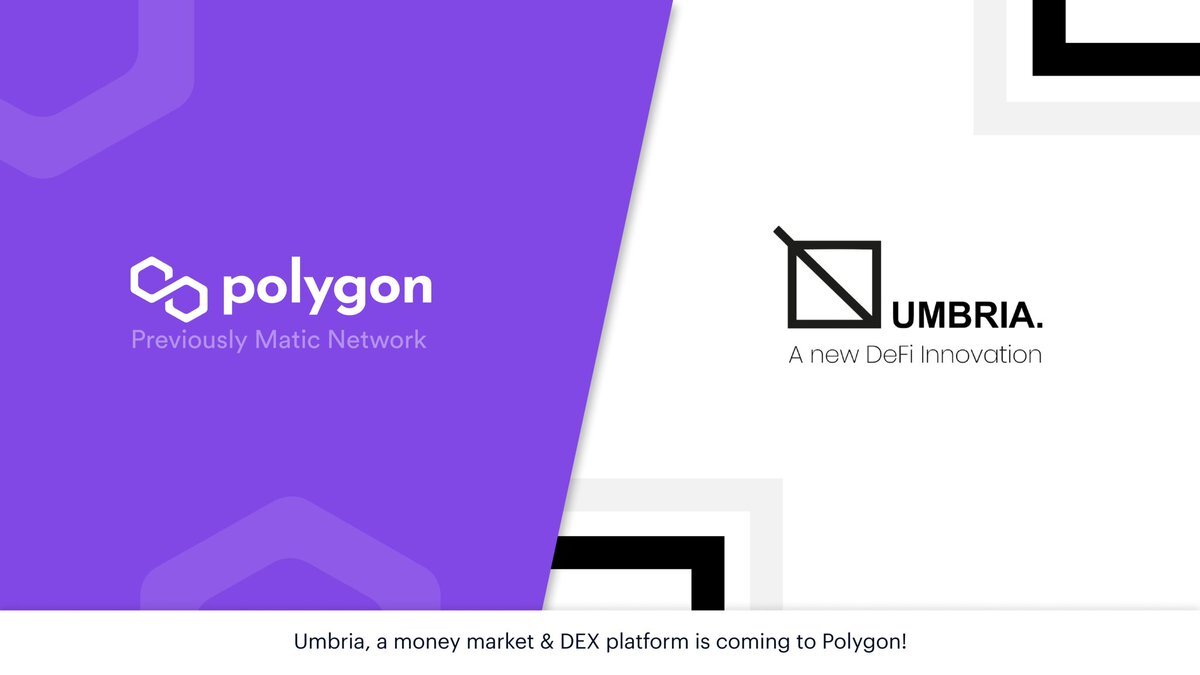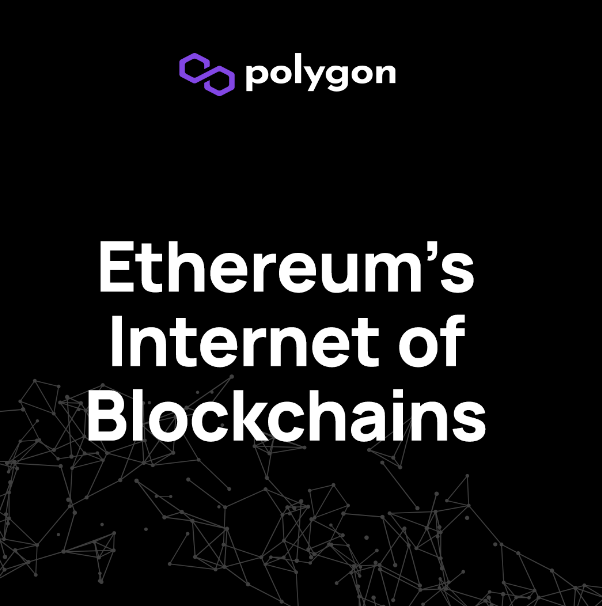> Blog > Post
Future of AMM: Umbria and Polygon discuss Uniswap V3
Posted 4 years ago 2021-04-20 11:19:30

Umbria is committed to building the next generation of DeFi protocols, learning from the most innovative projects and analysing any relevant updates in the industry. Umbria is working closely with Layer 2 scaling solution Polygon to achieve the best user experience and the lowest transactions fees for DeFi participants.
.....
At the end of March, Uniswap announced its upgrade to Uniswap V3 with some important new features set to go live on L1 Ethereum mainnet on May 5th, with an L2 deployment on Optimism set to follow shortly after.
Uniswap is a fully decentralised protocol for automated liquidity provision on Ethereum. A key innovator in the Automated Market Making (AMM) space and a critical infrastructure for decentralised finance, Uniswap is ranked as one of the most used decentralised exchanges (DEX), making up 60% of the DEX market.

In their latest podcast, Umbria co-founders Oscar and Barney Chambers together with crypto expert Stefania Barbaglio and Hamzah Khan, Growth at Polygon, discuss the new features and their challenges.
Main points raised in the discussion:
1- Capital efficiency
2- Layer 2 scaling integration
3- Licence agreements & community trust
4- Regulation & ‘tipping point’ of crypto
5- Non-fungible liquidity & oracles
6- Our questions
More Capital Efficiency
One of the main upgrades is ‘concentrated liquidity’, meaning that liquidity providers will have more flexibility with coin prices, making it easier to move in or out of a coin pool.
In this aspect, Uniswap V3 improves capital efficiency. The current limitation in Uniswap V2 is that most of the liquidity does not get used because prices of the pair change in a linear way. This limits the amount of liquidity that can be taken from a pair without altering the price of the cryptocurrency.
The upgrade to V3 allows people to put their liquidity on the exchange while having a lower and upper bound on how much their tokens are worth in comparison to one another, which is more capital efficient.
This update is great news: in this new version, users enjoy greater potential returns, more exposure to their preferred assets and - due to lower slippage - downside risks are significantly lower.
It means that, even with small liquidity in a pair, you have less slippage. It is also exciting for anyone who has a cryptocurrency project because it means people can purchase their crypto without worrying about getting a bad deal.
Multiple pools per pair offers flexibility and more incentives for Liquidity Providers (LPs); this coupled with improved user experience is overall great news.
.....
Release on Optimism vs other scalable solutions for Ethereum
The second big aspect is integration with Layer 2. Uniswap V3 will be introduced in the more scalable Ethereum Layer 2 solution, Optimism with the aim of achieving faster and cheaper transactions. In the current version, Uniswap has high fees that often work as a barrier against more users joining DeFi. This new feature is aimed at lowering gas fees for Uniswap transactions and reducing the current congestion in the network.

Optimism is a fully on-chain solution to scalability for Ethereum-based platforms, providing a solution that is very similar to Polygon. While these two platforms aim to overcome the limitations of Ethereum, they are different mechanisms. First, as pointed by Hamzah, Polygon is not a side chain, Polygon aims to be an aggregator for protocols built on Ethereum.
Secondly, whilst undoubtedly making transactions cheaper, Optimism still won’t be able to rival the low transaction costs of Polygon. It will be interesting to see how Optimism will roll out and manage transaction costs because there is a lot of liquidity to be moved onto the platform.
Furthermore, Polygon is a more versatile platform because it allows you to build a full suite of services on top of Ethereum.
Keeping costs of transactions at the lowest possible level is a crucial factor for DeFi and the key to mass adoption.
It will be interesting to see the reaction of other layer 2 projects; it is definitely an event driving further innovation.
.....
Licence agreements & Community trust
On this point, there is another V3 feature that shows Uniswap’s commitment to community/decentralised governance. Uniswap V3 will be launched under the terms of ‘Business Source Licence 1.1’, which will limit the use of V3 source code for commercial or production settings for up to two years.
This move was intended to give the Uniswap community more autonomy over its ecosystem. The community may also decide to push its expiration forward or grant exemptions. It also works to prevent further forks.
There were very interesting points raised in this aspect. We at Umbria think there are two sides in this: while it is fair to protect the code considering all the hard work of the Uniswap team to build it, it is a move that goes against the ‘open source’ spirit of DeFi.
Previous versions of Uniswap allowed for forks and other developers to copy the code, which gave sway to platforms like SushiSwap. The specific case of SushiSwap was quite positive because they made innovations on top of Uniswap and generally improved the service.
However, the introduction of a Licence can represent an impediment to the DeFi system. Here Hamzah gives us an interesting analogy to Microsoft:
It is so successful and widespread because they did not stop ‘unlicensed’ versions of their products. This enables them to reach a wider audience and get users familiar with their system. Access is important for adoption and innovation, especially in a space like DeFi.
This brought up the question of anonymity in DeFi and how important it is to gain trust from your community. Anonymity is not a new thing in crypto and many projects keep their team anonymous for various reasons. While privacy and freedom are hallmarks of the crypto movement, for a project to grow and gain the trust of the crypto community, it needs to be transparent.
Crypto is all about decentralising and empowering users to make their own financial decisions, and in this matter, transparency becomes a key aspect for successful projects.
It is always good to be public and honest because trust and community are the main things in crypto. If you don’t have a community, no one will buy your token or contribute to your project.
A lot of the major projects in DeFi such as Compound have gone the extra mile to be transparent about who they are and that’s definitely worked out. That’s also one of the reasons Uniswap is the biggest decentralised exchange.
Umbria and community trust

At Umbria we have a public listed company - Online Blockchain plc - acting as our advisor, co-ordinator and administrator. This gives us technical and business tutelage and helps us in bringing credibility to our nascent and ambitious project.
.....
Regulation & the ‘tipping point’ in crypto
The conservation moved onto the increasing regulation in crypto and how this could impact users. As exchanges and platforms are receiving more attention and funding from institutional investors, they also move towards more regulation and becoming incorporated bodies.
The question of regulation in crypto has always been a hot topic seeing as the entire purpose of the industry is to provide financial autonomy to users and stop reliance on central institutions.
We believe there are two sides to this discussion: some level of regulation is necessary to stabilise the market, but it should not corrupt the core spirit of crypto, which is decentralisation.
There are some cases where regulation helps like centralised exchanges because you need them to be regulated and held accountable, but there is utility in the decentralised world that cannot be regulated for the same reasons we have internet privacy. There will be growing demand on both sides.
The crypto industry is reaching the tipping point of becoming more mainstream. Some examples are Tesla accepting Bitcoin and the recently-announced move from Visa to accept USC Coin (USDC), an Ethereum-powered stablecoin.
Also bigger projects, for example Compound, may have more interest in having a reliable profile so that they can attract institutional investment.
These are good signs for crypto as a whole as it shows that the market is reaching greater maturity and people have started to feel more confident about the potential of cryptocurrencies to supplant fiat.
.....
Non-fungible liquidity & advanced oracles
One of the last points raised in the discussion was on the introduction of non-fungible liquidity aka NFT Liquidity. This means that liquidity positions will no longer be fungible and will provide related advantages and opportunities, giving more flexible fees; and an improvement in advanced oracles to reduce the costs of having an up-to-date oracle by 50% compared to V2.
On this there is a great potential for NFTs to be developed in some specific markets such as insurance since NFTs represent unique non-replicable assets.
.....
Are there potential concerns with V3?
We are curious about the migration of liquidity from V2 into V3; will any technical difficulties arise and impact user experience, and could there be an increase in gas fees? We also look forward to seeing the ways DeFi projects can make laymen and beginners join the movement.
We think this will be a great educational experience as there may be good lessons to be grasped and implemented in our own systems to help improve Umbria.
Overall, we feel that discussing Uniswap V3 was a good exercise to see where the DeFi industry is moving as whole. There are plenty of aspects to improve and there is plenty of potential to be harnessed.
We want to hear from you…
If you have any comments to add on Uniswap V3 and what is represents for the DeFi industry, please add them in the section below.
Listen to the discussion on the #FinancialFox podcast:
https://open.spotify.com/episode/1iYt0hbNRExNlOE8SqXfzA
Head over to the Umbria Discord channel, Telegram, Instagram, Twitter, Facebook or LinkedIn to find out more about the project. Become part of the journey!